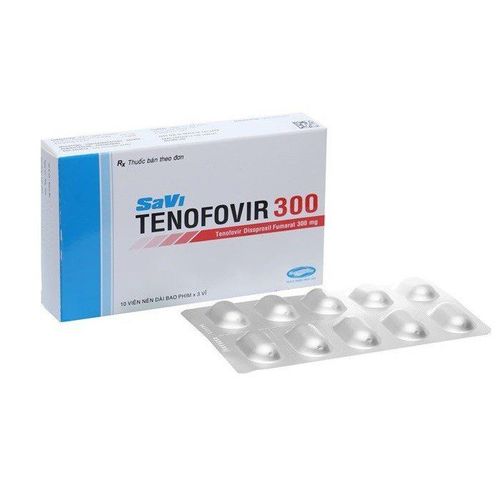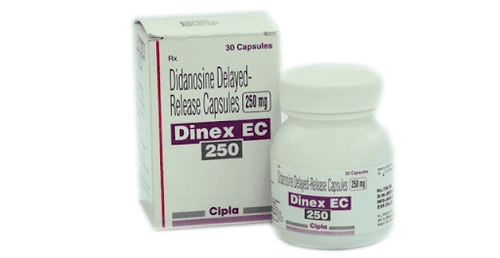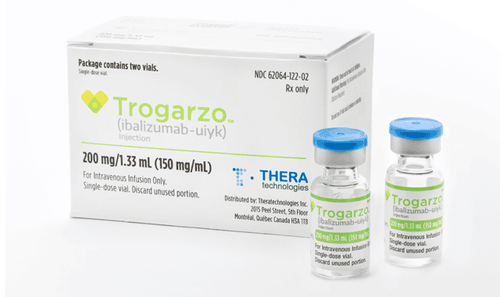This is an automatically translated article.
Zidovudine is a viral reverse transcriptase inhibitor and is therefore often indicated for the treatment of HIV infection, prevention of mother-to-child transmission of HIV, or occupational exposure to HIV. So what is Zidovudine and how is it used?1. What is Zidovudine?
What is Zidovudine? Zidovudine (also known as Azidothymidine or AZT) is a nucleoside reverse transcriptase inhibitor, chemically similar to Thymidine and, after conversion to an active metabolite, exerts an inhibitory effect on thymidine. copies of retroviruses, including HIV. The mechanism of action of the drug Zidovudine is unknown, it is hypothesized that this active ingredient inhibits reverse transcriptase. Zidovudine triphosphate is structurally similar to thymidine triphosphate, which is a common substrate of viral reverse transcriptase enzymes. Thus, zidovudine can reduce the above-mentioned natural substrate concentration of the reverse transcriptase enzyme and facilitate drug binding to this enzyme.
Drug form and content of Zidovudine :
Zidovudine tablet content 300mg; Zidovudine capsules with the strength of 100mg and 250mg; Zidovudine syrup content 50mg/5ml (240ml bottle); The solution for infusion contains 10 mg of Zidovudine per ml, the solvent being distilled water for injection.
2. Indications of the drug Zidovudine
Indications to use Zidovudine in the following cases:
Treatment of HIV-infected patients; Zidovudine for use in HIV-seronegative pregnant women (initiating Zidovudine at 14 weeks of gestation) for the prevention of mother-to-child transmission of HIV; Zidovudine treatment in neonates for the primary prevention of HIV infection; Zidovudine prophylaxis for people exposed to HIV by occupation.
3. Contraindications of Zidovudine
Zidovudine is contraindicated in the following cases:
History of severe hypersensitivity to Zidovudine and life-threatening risk (such as anaphylaxis or Stevens-Johnson syndrome); Severe hematological disorders: hemoglobin concentration less than 7.5g/dl or neutrophil ratio less than 750/mm3 of blood; Neonates with hyperbilirubinemia require phototherapy or have transaminase levels more than 5 times the upper limit of normal.
4. Instructions for using Zidovudine
Zidovudine can be administered orally, by continuous or intermittent intravenous infusion. Note that Zidovudine is not suitable for use by rapid injection or injection of a whole dose at once.
To avoid the risk of esophageal irritation causing ulcers, patients should take Zidovudine capsules in a standing position with enough water (at least 120ml of water).
Zidovudine concentrated solution for intravenous infusion has a concentration of 10 mg/ml, so it should be diluted before use with 5% dextrose injection solution to obtain a solution containing not more than 4 mg of Zidovudine per ml. intermittent intravenous infusion over 60 minutes.
Dose of Zidovudine for adults:
Treatment of HIV infection: 600mg/day, divided into 2 or 3 times orally or intravenously at a dose of 1mg/kg/time x 5-6 times/day (equivalent to 5-6 mg/day). kg/day); Prevention of HIV transmission from mother to fetus: At the onset of labor, pregnant women must receive a continuous intravenous infusion of zidovudine 2mg/kg within 1 hour, followed by a maintenance dose of 1mg/kg/hour. continuous infusion until clamping the umbilical cord; Prophylaxis after occupational HIV exposure: Oral zidovudine 300mg x 2 times or 200mg x 3 times, in combination with other antiretroviral drugs. Duration of administration begins after the time of exposure (as soon as possible) and continues for 4 weeks, if zidovudine is tolerated; Prophylaxis after non-occupational HIV exposure: Oral Zidovudine 300mg x 2 times or 200mg x 3 times, combined with at least 2 other antiretroviral drugs. Prophylaxis with zidovudine in this case should be started as soon as possible (preferably within 72 hours) and maintained for a full 28 days. Children's dose of Zidovudine:
Treatment of HIV infection in children 6 weeks to 12 years old: Oral: Zidovudine dose is calculated by weight or body area. The dose based on body area is 160mg/m2/time, every 8 hours or 240mg/m2, every 12 hours. Zidovudine oral dose based on body weight: Children 4 to under 9 kg use 12 mg/kg/time x 2 times or 8 mg/kg/time x 3 times daily; children 9 to under 30 kg use a dose of 9 mg/kg/time x 2 times or 6 mg/kg/time x 3 times daily; Children 30kg or more use Zidovudine 300mg x 2 times or 200mg x 3 times a day; Continuous intravenous line: Dose 20mg/m2/hour; Intermittent intravenous infusion: 120 mg/m2/dose, administered every 6 hours; Treatment of HIV infection in infants and young children under 6 weeks: Start giving Zidovudine immediately after birth, preferably within 6-12 hours and continue until 6 weeks of age: Full-term neonates: Zidovudine 2 mg/kg every 6 hours. If oral is not possible, intravenous infusion at a dose of 1.5 mg/kg every 6 hours; Preterm infants: Initial dose 2 mg/kg every 12 hours. If oral administration is not possible, intravenous infusion of zidovudine 1.5 mg/kg every 12 hours; Zidovudine Prophylaxis of Mother-to-Fetal HIV Transmission: Full-term newborns should be started with Zidovudine as soon as possible after birth (preferably within 6-12 hours) and continue taking Zidovudine throughout the first 6 weeks of life. first. Zidovudine dose for some other subjects:
Reduce dose in patients with severe renal impairment, the appropriate dose may be 300-400mg/day. If patients with end-stage renal failure require hemodialysis or peritoneal dialysis, Zidovudine 100mg oral dose or intravenous infusion dose of 1mg/kg every 6-8 hours is recommended; In patients with mild to moderate hepatic impairment, due to insufficient clinical experience, there is no specific recommended dose, the dose can be reduced if necessary and regularly monitored for adverse events on hematology.
5. Zidovudine side effects
Zidovudine can lead to some common side effects as follows:
Anemia, neutropenia; Headache ; Irritability, nausea, vomiting, diarrhea and abdominal pain; Increased blood transaminases and bilirubin; Muscle pain. Uncommon side effects of Zidovudine:
Decrease in whole blood cells with bone marrow hypoplasia; Thrombocytopenia; Shortness of breath; Full stomach; Rash, itching; Myopathy; Tired; Fever and pain all over. Rare adverse effects of Zidovudine:
Red blood cell aplasia causing aplastic anemia; Lactic acidosis in the absence of hypoxia; Anorexia; Anxiety, depression; Convulsions; Dementia ; Insomnia, paresthesia or somnolence.
6. Precautions when using Zidovudine
During the use of Zidovudine, patients should pay attention to the following issues:
Zidovudine often causes blood toxicity, including neutropenia and/or severe anemia. Therefore, blood cell counts and anemia indicators must be taken before and monitored during treatment with Zidovudine. For people with end-stage HIV infection or with low blood cell counts and primary anemia, regular monitoring is required while taking Zidovudine, with periodic monitoring. Zidovudine should be used with caution in people with impaired liver or kidney function or in patients with reduced blood flow to the liver. Zidovudine should be used with caution in patients with impaired bone marrow function. Lactic acidosis should be considered when a patient receiving zidovudine experiences shortness of breath, unexplained tachypnea, or decreased serum bicarbonate levels. Patients treated with Zidovudine should be monitored for serum transaminase levels, if a rapid increase and liver enlargement are observed, the drug should be discontinued. Patients receiving zidovudine and interferon alpha with or without ribavirin should be closely monitored for toxicity, especially decompensated liver failure, neutropenia, and anemia. The safety of zidovudine for the mother and fetus during the first trimester of pregnancy has not been established. However, the risk of mother-to-child HIV transmission should be prioritized for treatment. Women infected with HIV should not breast-feed their babies to avoid transmitting the infection to children who may not be infected
7. Zidovudine drug interactions
Do not use Zidovudine in combination with Ribavirin, because of the increased risk of toxicity, especially lactic acidosis. Avoid combining Zidovudine with Rifampicin or Stavudin. The concentration/effect of Zidovudine may be increased when combined with Acyclovir, Valacyclovir, Doxorubicin, Fluconazole, Ganciclovir-Valganciclovir, Interferon, Methadone, NSAIDs, Probenecid and valproic acid. The concentration/effect of Zidovudine is possible in combination with doxorubicin, protease inhibitors, rifampicin derivatives and tipranavir. Zidovudine injection solution should not be mixed with biological fluids or colloids (such as blood products or solutions containing proteins). Zidovudine is a viral reverse transcriptase inhibitor and is therefore commonly indicated for the treatment of HIV infection, prevention of mother-to-child transmission of HIV, or occupational exposure to HIV. To ensure the effectiveness of treatment and avoid unwanted side effects, patients need to strictly follow the instructions of the doctor, professional pharmacist.
Follow Vinmec International General Hospital website to get more health, nutrition and beauty information to protect the health of yourself and your loved ones in your family.
Please dial HOTLINE for more information or register for an appointment HERE. Download MyVinmec app to make appointments faster and to manage your bookings easily.













